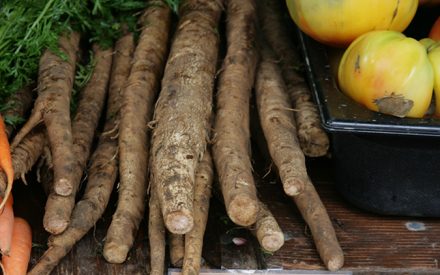Transcript
Hello and thank you for joining us for this Rural Entrepreneurship video series. My name is Katie Wantoch and I am a farm management outreach specialist with the UW Madison Division of Extension. In this video, I’ll be talking about record keeping for the food and farm business and introducing the farm business financial model, which can be a useful tool for decision making.
Keeping records is the backbone of managing one’s farm business. Efficient management of a farming operation requires that records be maintained to enable the owner to make informed decisions affecting their profits. Farming is a complex business which demands accurate records and careful financial management.
Farming is widely viewed as a way of life rather than a business. Both financial and production records are required to provide information you need to make critical risk management decisions. Farmers need to keep records to pursue effective risk management strategies that will enhance the longer term profitability of their business.
As shown on your screen,the Farm Financial Model offers a linear and circular process for informed decision making. Records feed into reports and reports help farmers integrate financial sense into farm production decisions. The farm financial model begins with records which details collecting and organizing of your farm business’ production and financial information. In this part of the process, you should be collecting production or physical records.
You must also collect and organize your financial records or your income and expense receipts in an accounting system. This is called receipt accounting or recordkeeping. With this information, you’ll be able to generate financial statements and can begin creating management reports for decision making.
Let’s look at what records you may be collecting. There are several types of farm records to collect and organize for your farm business. Production or physical records may be related to livestock production, such as identification weights, date of birth, pregnancy rate, calving rate, death loss rate, average weaning weight, or average daily gain. Crop production, like yields, inputs of fertilizer or seed, pesticide application, irrigation methods, planting and harvest dates.
Labor on your farm should include both paid and unpaid labor, such as family. Weather may affect your business, so you want to record precipitation, wind, storm events that produce hail or snow. Financial records that you want to keep include income and expense receipts from the operation of your business, like invoices received or sent to customers, checks paid, bank statements.
But why is it necessary to keep so many records? As a farmer, your records may need to be provided to lenders, insurance companies, government agencies, and will help you document safe handling practices, organic standards, etc.. One of the most important decisions is deciding how to track your production and financial records. There are many ways for you to keep your records.
It is important to find the one that works best for you. There are three different methods to organize your records. The paper method, the electronic method, and outsourcing of your records.First, the paper
method is also known as the shoebox method. This method is simple as you only need a pen and paper, notebook, or ledger book to write down specific production and/or financial records. Second, to use an electronic method of record keeping, you might use one of these tools: a spreadsheet such as Microsoft Excel, Google Sheets, etc., or a software business package such as QuickBooks or Quicken, or more farm specific software packages like CenterPoint Farm Biz, PC Mars, Ultra Farm Accounting and others.
And finally, you might look at outsourcing of your record keeping. This method utilizes a professional to manage the records of your farm business. As you can see from the table on your screen, there are pros and cons to the three recordkeeping methods. While the paper method does not use a computer and has minor costs, it is limited in the extent of the analysis that you can do without extraordinary investment of your time and effort. The electronic method may save you time over the paper method, since a tool may complete the calculations for you and assist with analysis. However, basic knowledge of computers and the software programs is necessary along with time to learn the tool, design it for your farm business, and enter the information correctly.
Another method that you can use is outsourcing your recordkeeping. This method utilizes a professional to manage the records for your farm business, which will save you time but will be more costly than the other two methods.
Which is the best recordkeeping system to use for your food or farm business? Recordkeeping is best kept simple. There is no best recordkeeping system for all situations.If the recordkeeping method is too complicated, you may be more likely to make mistakes or avoid recordkeeping altogether. Records should provide essential information on a timely basis. Both financial and production records need to be collected and organized to generate management reports for your farm business decision making. Remember, these records are going to be used to help you analyze your farm’s financial position and performance, so it’s essential that they are accurate. If you would like more resources or information, please visit our extension Farm Management Web site at farms dot extension dot wisc dot EDUto help you start your food or farm business.
Extension provides a variety of articles and videos on related topics,such as collecting and organizing your farm records and selecting your farm financial accounting system. In addition, Extension has developed the Farm Pulse Financial Management and Analysis online curriculum, which is a self-paced online course for farmers and others interested in learning how to use their farm financials to explore their farm business decisions.
This course will help you evaluate your finances, take the pulse of your farm business and set goals for the future of your operation. Learn more about the course at Go dot wisc dot EDU backslash farm pulse.
Feel free to reach out to the farm management program with any questions by emailing farms at extension dot wisc dot EDU. Thank you for joining me to learn about record keeping for your food and farm business.

 Organic Transition: Purpose, Process, and Resources
Organic Transition: Purpose, Process, and Resources Partnerships for Your Food or Farm Business
Partnerships for Your Food or Farm Business Finding the right people
Finding the right people Permits, licenses, and labels
Permits, licenses, and labels


